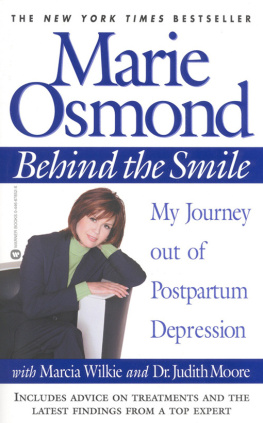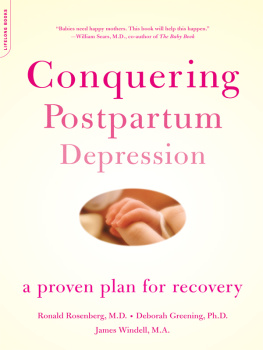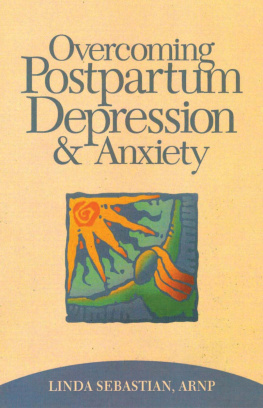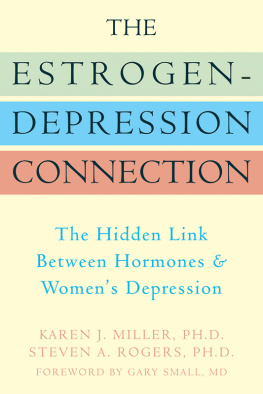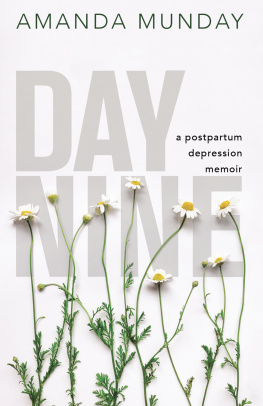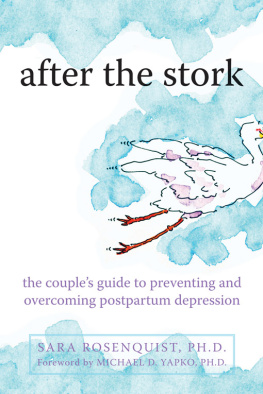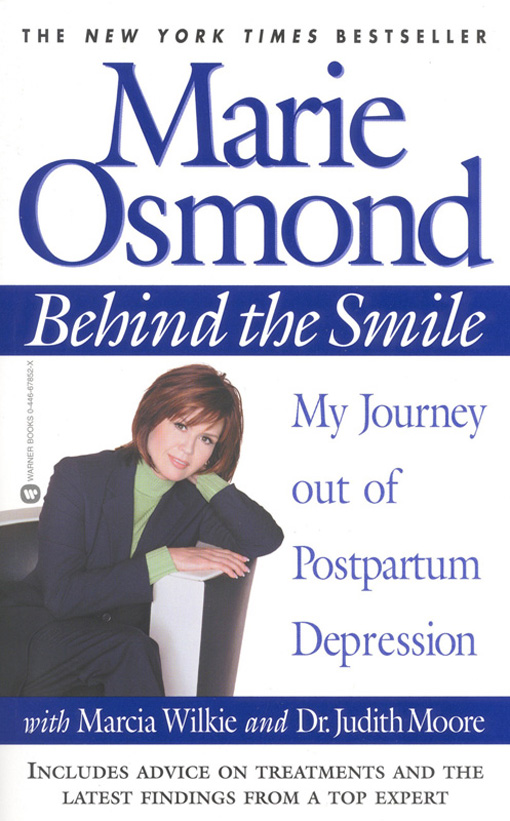Copyright 2001 by Marie Osmond
All rights reserved.
Hachette Book Group, 237 Park Avenue, New York, NY 10017
Visit our Web site at www.HachetteBookGroup.com
A Time Warner Company
First eBook Edition: May 2001
ISBN: 978-0-446-54991-2
Text design by Stanley S. Drate/Folio Graphics Co. Inc.
The Warner Books name and logo are trademarks of Hachette Book Group, Inc.
To my mother, for giving me life and the courage to live it more fully.
And to all the women enduring PPD who shared their stories with me; a promise kept.
There's a side effect of postpartum depression that I chose not to mention in the book because I felt the best place for it to be revealed is here in the thank-yous. It's one that I hope to live with for the rest of my lifeimmeasurable gratitude. When I was barely existing with PPD, every act of kindness both large and small was magnified for me. Each act felt like a hand to hold in the darkness and a guide to show me a way to get through the next minute, hour, and day.
There are many who deserve my gratitude. I especially want to thank those who made this book a possibility.
My husband, Brian, for his immeasurable love and for encouraging me to tell my story truthfully, and my children, who make me love being a mother more every day. You are and will always be everything to me.
My mother and father, Olive and George Osmond, and all my brothers: I live with your live and support every day. What a fortunate person I am.
Dr. Judith Moore: You are a healer in the truest sense of the word. Thank you for being dedicated to this project and to the many women who will benefit from your knowledge.
Marcia Wilkie: I love our friendship. Your untiring efforts through countless hours of interviews, having my babies hanging off your limbs, long plane trips, doll signings, two A.M. IHOP emergencies, and just thinking out loud with me brought my thoughts, my experiences, and this book together. I couldn't have done it without you.
My business associates, who are also my friends: Karl Engemann, my personal manager, because you held me together in my most scattered moments, and for your loving protection throughout. Allen Finlinson, my business manager, for arranging and rearranging my schedule and for being smart enough to keep my calendar in pencil. Steve Horton, my CPA and business adviser, for your assistance and support, and for bringing in extra-crispy bacon (just the way I like it) when we had been up all night writing. Lisa Hatch, my creative director, for your excellent editing eye, the hundreds of laughs, and your willingness to listen again and again. Kesti White, for formatting, fixing, and finding where I left my glasses, my keys, my notes, and my brain.
Also, thank you to those who stood by me when I could barely stand on my own, and who filled in the blanks when I forgot: Missy Garcia, for your loving friendship and steady presence, for pulling my hand out of the box of chocolates after three pieces, and for giving me directions to work almost every day! Georgia Blosil and Kathy Blosil, I'm so grateful for family. Patty Leoni, my lifelong true-blue partner in crime, I love you. LuAnn and Mike Samuelian, Shawn King, Linda Glather, Charles Cook, Maureen FitzPatrick, Dina Cerchione, Ret Turner, Leslie Feinauer, Maria Seno, Kim Auten, and the staff and crew of Donny & Marie.
Finally, many thanks to Mel Berger and John Ferriter at the William Morris Agency, Marleah Leslie and Anne Israel-Gurrola, Caryn Karmatz Rudy, Amy Einhorn, and Molly Chehak at Warner Books.
Marcia Wilkie extends sincere thanks to Lizzie Isely, Elizabeth Lachman, Maureen FitzPatrick, and especially to Patricia Bechdolt.
T his weekend is my son Matthew's first birthday. Giving birth to him put me on a new course in life. It opened my eyes to many things in my personal life that needed renewal or change and made me aware of the lives of many, many women who struggle, as I have with postpartum depression. He sure accomplished a lot in his first year of life.
Seventeen years ago, when I went into the hospital to deliver my first baby, my mother said to me, Don't worry, Marie. The pain will only get so bad and then you will just black out. I've always appreciated my mother's willingness to tell me the truth about life in her humorous way (it's where I got my own sense of humor). However, in my experiences of giving birth, I was never able to just black out. I guess there's a downside to having a high pain tolerance. But even that wasn't enough to deal with the pain brought on by postpartum depression. Still, I couldn't just black out. I had to experience it in full. Now I know there was a reason.
Postpartum depression (PPD) is a heartless invader that holds over 15 percent of new mothers hostage. It floods them with self-doubt, anxiety, and feelings of shame that can lead to isolation. It can occur right after giving birth, or weeks and even months later. It can happen after any birth, not just the first baby. It's estimated that 80 percent of all new mothers have a short-term experience with the blues due to fluctuating postnatal hormones, however, women with PPD have a much more severe and lasting reaction. It may begin with a hormonal and chemical imbalance, but the effects on emotions, moods, and behavior last well beyond the two weeks considered normal for the baby blues. Some women continue to experience PPD for up to two years after the birth of a body. Adoptive mothers can also suffer from symptoms of postpartum depression.
A woman with PPD may feel like she has no maternal instinct and that she can't even take care of herself, let alone a body. Worse yet, she may feel she has nowhere to turn.
Since I first spoke publicly about my journey through postpartum depression, I have received thousands of letters from women who are suffering to varying degrees with PPD. Some women described bouts of weeping, anxiety, and fatigue. Others endured mind-numbing dysfunction of thoughts of extreme behavior involving hurting themselves of their babies. One of the common threads in the letters was a plea for help in finding more answers, from which could come compassion, understanding, and insight into why women suffer from PPD. Some of the letters came from women who had been institutionalized and rejected by their families.
Is it any wonder PPD has been hidden away, hushed away, hushed up, and ignored for so many years? After all, how do you find a way to explain to anyone, especially other women who see this as the most joyful time in your life, that you are in complete despair and emotional pain? How do you relate feelings be being cast into a wasteland void of familiarity? Where do you find the words to explain that you can hold a new life in your arms and still feel no hope for the future? Who will you tell that you're not sure you'll make it through this very day? How can you possibly talk about it when you know that it could result in people thinking you are selfish, irresponsible, or crazy, or even worse, having your baby taken away from you?
These questions reflect the reason I wanted to write this book. As difficult as my experience with PPD was, I know that I was spared some of the severe symptoms that have caused women to lose their livelihoods and even their families.
I do understand, however, what it feels like to be searching for an answer, something to give you hope that you can and will be happy again. I've been there. I went through months when I was certain I would never feel like myself again, or even know who myself was. There were devastating days in the first couple of months following my son's bright that have stayed as near to my consciousness as if they had happened yesterday. It has been important to me to record these thoughts and feelings while they are still close to me, while I can still remember clearly what it feels like to struggle every day with PPD.

